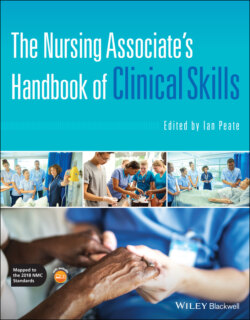Читать книгу The Nursing Associate's Handbook of Clinical Skills - Группа авторов - Страница 144
Yellow Flag
ОглавлениеKnowing the patient in relation to their specific illness and the context of their lives is essential; ‘knowing’ will reflect the patient’s feelings, their perceptions, expectations and also their beliefs. This will establish the patient’s own health beliefs as well as how they may respond to illness, future life events and experiences.
Defined as the ‘ability to recognise the meaning of emotions and their relationships and to use them as a basis of reasoning and problem‐solving’ (Mayer et al. 2001, p. 234), emotional intelligence is not always easy to translate. To be emotionally intelligent is generally described as a core aptitude related to one’s ability and capacity to reason with one’s emotions, especially in relation to others (Freshwater & Stickley 2004, cited in Williams 2015), which might suggest that nursing associates may possess the knowledge and skills but lack the ability to transmit them, and for a successful nurse–patient relationship, a balance of both would seem essential. This will be discussed further within this chapter.
The final of Carper’s (1978) four patterns of knowing is concerned with ethics. This focuses on the moral knowledge of the nurse, more specifically, a sense of knowing what is right and wrong for the patient. Every nursing associate will possess their own set of personal ethics and morals which they live by. Within healthcare practices, nursing associates should recognise healthcare dilemmas and make good judgements and decisions based on their values whilst keeping within the laws that govern them (Östman et al. 2019). Carper (1978) acknowledges that these patterns of knowing are not mutually exclusive, and nurses are seen to use attributes of all four patterns to successfully deliver patient‐centred care.
Incorporating Carper’s (1978) patterns of knowing, Johns (2000) suggests guided reflection as an addition pattern of knowing. The use of reflecting on experience as a means of enhancing clinical practice stems from the work of Schön (1983). Reflective and critical thought can help reason prejudices ensuring a growing awareness through reflective critical thought with regards to the nature of knowledge so not to assume things are true when they simply are not (Rolston et al. 2016). Benner (1984) points out that not all knowledge embedded in expertise can be captured in theory and furthermore believes that nurses need emotional space to think and feel about their practice. Reflective practice allows the nursing associate to explore the emotions that engaged or involved them in the situation, in the first place. Reflection can be described as the ability to explore one’s own actions, thoughts and feelings and think purposefully to gain new insights, ideas and understanding (Rolston et al. 2016).
Following Carper (1978), further theories have focused on how nurses go about gathering information to get to know the patient. In brief, Watson’s (1985) Transpersonal Caring theory indicated that nurses gain insight into a patient’s response to illness through a relationship exemplified by respect, compassion and support, pointing out the critical link between a deep connection with the patient and the nurse’s knowing, mirroring features of the therapeutic nurse–patient relationship. This is reinforced in Swanson’s (1991) theory of caring, where the dimensions of knowing are defined further to include avoiding assumptions, cue seeking and engagement of self, alluding to features of emotional intelligence.
